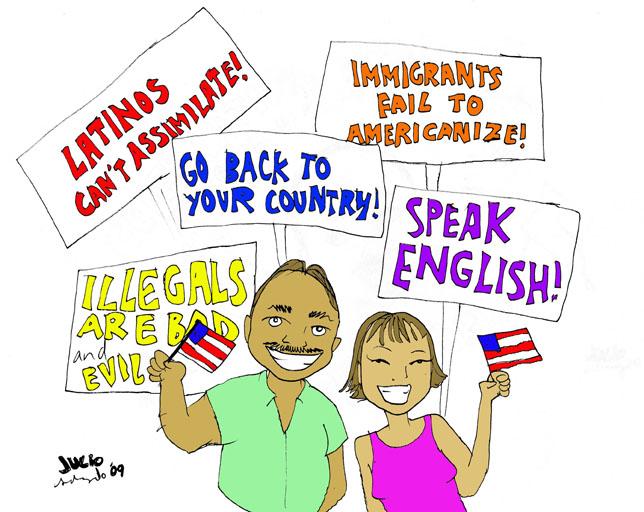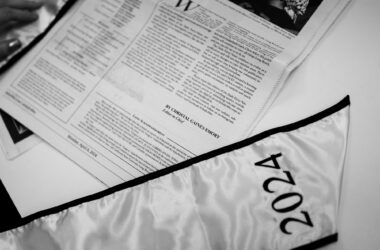Metaphors like “America is a melting pot” and “The U.S. of A. is a salad bowl” are archaic and offensive. Such phrases create historical illusions that minority immigrants are mere seasoning to add flavor to the dominant society structures, rather than offering validity for earning U.S. citizenship.
In actuality, immigrants — both naturalized and undocumented — are political forces to be respected in our modern spheres of policy making. Last year showed that modern history is in the making as more than 1 million immigrants became U.S. citizens, according to the U.S. Office of Immigration Statistics.
California led the charge by having 300,000 new citizens raise their hands to swear allegiance to the U.S., accounting for almost one-third of the nation’s total. This nearly doubled the state’s 2006 numbers. Latinos and Asians were the two largest immigrant groups swearing in, with Mexicans representing the largest group to become naturalized.
This will be extremely significant when it comes to shaping public policy in areas such as education, healthcare and immigration reform, according to the Los Angeles Times. Although the majority shift is expected in 2026, the L.A. Times cited a demographer from USC that “Latinos, Asians and African Americans are already joining with progressive whites to elect ethnically diverse candidates.”
While not all people in any minority votes in homogenous blocks, Asians and Latinos lean toward supporting social policy measures more than whites, as shown in several polls.
The Public Policy Institute of California shows that most Latinos support all five of the budget measures in Proposition 1 A-F on next week’s ballot, although most whites are against them. This could turn the Gov. Arnold Schwarzenegger-sponsored package into a veritable ballot battle.
Additionally, Asian Americans largely supported providing healthcare to employees in 2004 initiatives, while white voters were against the concept.
Asians and Latinos also are more supportive as a whole of Democratic Party national politics. In last year’s presidential election, Barack Obama overwhelmingly drew support from nonwhites, while his Republican counterpart drew mostly white voters, according to a study from the Pew Research Center. “Latino registered voters increased by 3 million compared to 2004,” the L.A. Times reported.
The future will provide a major demographic shift in the state’s political arenas, which could consequentially impact policy on the national stage. In fact, signs are already popping up that minorities are demanding more inclusion in national government.
With Supreme Court Justice David Souter’s recent announcement that he will retire this summer, groups have been aligning to pressure Obama to appoint a minority judge.
CBS News reported that the Congressional Hispanic Caucus, in a call to the White House, told Obama that “appointing our nation’s first Hispanic justice would undoubtedly be welcomed by our community and bring greater diversity of thought, perspective and experience to the nation’s legal system.”
Among the potential candidates drawing widespread recognition is New York federal appeals court Judge Sonia Sotomayor. Sotomayor, the first American Puerto Rican appointed to the federal bench, would fit two diverse aspects many are calling for — a woman and an ethnic minority. She would be the first Hispanic justice on the Supreme Court, if appointed.
Republican conservatives will undoubtedly run smear campaigns no matter whom Obama tries to appoint. What matters greatly — notably for Republicans — is that they must review how they perceive minorities, including new citizens and non-citizens.
Otherwise, they could find themselves without an invitation to the “salad bowl” at the political dinner table.





This is probably the first time that somebody has been derided as a racist for arguing that a group of people are Americans; usually they are described as racists for arguing the opposite. I guess racism is alive and well in the Hispanic community. I am white, and such a racist that I presently work as a tutor in Cudahy and East LA, working with kids from underperforming schools (I’ve also worked in South Gate). I’ve therefore given more to the Latino community than most Latinos. I’ve also traveled through more parts of Mexico than most Mexicans, with the exception of its east coast. I also grew up in a mixed neighborhood in Norwalk, and my brother and sister are half-Mexican from my mom’s previous marriage. My Spanish is also very good, though not perfect. Thus, my racist credentials seeem to be pretty poor.
I read your passionately argued comments Rico, but found a lot of holes in your reasoning. E.g., you don’t want PR to become a state because you don’t want it to become like the other 50 — you mean prosperous, with a high quality of life? Are you clear on the fact that Cuba was a foreign country even in the 1940s, and so not comparable to Puerto Rico? Also, will you be going back home to live after you finish your education? Probably not?
As for you other half-wits who have been decrying the left turn the comments here have taken from the content of the article, that happened after I made the innocuous and complimentary comment, ‘”American Puerto Rican” is redundant. Puerto Ricans are already Americans with full citizenship.’ A short time later there were five or six comments all criticizing mine. Pretty silly, right?
Rico you mentioned the Latino/Hispanic thing, so I will fire the first barrage (I don’t stop, as you can tell). ‘Latino’ of course comes from ‘Latin,’ the language and core ethnic group of the Roman Empire, who were called Latins when they were a small tribal group on the Italic Peninsula. Latin was ancestor to the Spanish language, but also of French, Spanish and all the rest. Thus, it doesn’t make sense to describe Spanish-speakers as Latinos, but not other speakers of Romance languages. “Hispanic” comes from Hispania, which is what the Romans called their province on the Iberian Peninsula, which comprises the modern-day nations of Spain and a small part of France. If you argue that this doesn’t do justice to the indigenous peoples of Latin America, then I would agree with you. However, both terms refer to the Hispano-Roman origins of the Spanish conquerors, their language and the culture that they brought with them, so that I would argue that both terms are synonomous. However, these are arbitrary terms and mean different things to different people, so that the argument cannot ever be resolved. Based upon your previous poorly-reasoned arguments I will say ahead of time that this answer is at least as well-reasoned as anything you come up with.
Not seeing anything from Jason Aula yet (unless he’s posing as Chris Herrin) LOL. Wouldn’t be surprised; they’re both white, right?
I agree with “Your name” #10. What a bunch of dimwits to turn the topic of new citizenry and the power of potential policy change/makers into a rudimentary argument about Puerto Rico’s statehood/American Puerto Rican redundancy. Did you guys find a catch phrase that you knew a tiny bit about and shift your focus. There are medications for Attention Deficit Disorder. I suggest you take them before you put your names to such ignorant public comments. Try eating more green plant food, taking Ginko Biloba or whatever else might stimulate your brain cells.
Completely unimpressed at how Chris Herrin and other comments have side-tracked from this articles context. I truly hope none of these inane people are sucking the life out of taxpayers by paying their way through college on financial aid. Please look before leaping! Scoot up closer to the article and stop playing children’s games with words. You only make yourselves look ignorant.
To Chris Herrin: call it imperialism, isolationism or colonialism–what stands as why we Puerto Ricans AND American Puerto Ricans for our rejection of U.S. statehood is that we have seen the sacrifice of sovereignty. Without allowing the U.S. to completely dominate (although they almost do anyway) political independence on our island is that in so rejecting the 51st star, we maintain a smidgen of self-respect that our culture will not be homogenized and we will not become the Cuba of the 1940s; completely controlled by American gangsters and corporations. That 4 percent was enough to protect our tiny space in autonomy. Otherwise, we would be as economically straddled as the upper 50. Things might not be perfect in Puerto Rico, but for right now–it sucks to be you. As a sidetrack, we also have the opportunities to travel that U.S. citizens with singular citizenship are currently excluded from without Visa/Passport. Why would it be in our best interest to sacrifice a better brand of global independence? Neither one of you who is citing Wikipedia can speak from a cultural or intellectual plank until you’ve had a better historical reference from which to jump. The next ethno/Eurocentric thing I expect from either is that all “Hispanics” are Latino, or vice versa. Grab something beyond Hemingway’s drunken typewriter.
It does seem bizarre and hypocritical when I hear people decrying the disenfranchised status of the territory of Puerto Rico. The US Constitution plainly says that only states shall have full voting rights. The people of Puerto Rico are therefore freely choosing to limit their own political status when they freely choose at the voting booth to remain an unincorporated territory, which they did last time (in 1998) by a thin margin. What I’m hearing in some of these comments is ciruclar reasoning — and that’s being kind. As for the notion that Puerto Ricans don’t want to become a state because of the history of colonization of the island, that is disproven by the fact that there are now more Puerto Ricans living in the mainland US than in Puerto Rico itself. What I’m reading in some of these comments is Far Left incoherence stretched to absurd limits.
Let me elaborate on my comment about the redundancy of the “American Puerto-Rican” line. Puerto Rico is an unicorporated territory of the US. The territory does not have full state’s rights but the people do. E.g., in regards to voting, Puerto Ricans can vote in federal elections, they just cannot do so from the island — they have to go to the mainland and would be subject to that state’s voting laws. Likewise, an American from one of the fifty states cannnot vote in Puerto Rico, but would have to return to the mainland (or Alaska or Hawaii). The person who quoted Wikipedia should have read a little farther. Puerto Ricans are born as full US citizens and during the draft were drafted into the military along with everybody else. Again, the limits apply to the territory, the land, not the people, who are full US citizens.
Since we’re quoting Wikipedia, here’s a good one: “Since 1917, people born in Puerto Rico are U.S. citizens. As such, they are entitled to vote at the federal level, but not from the island, as the territory is not incorporated. The legal restriction to vote at the federal level extends only to the territory, not to its citizens. In this fashion, all U.S. citizens can vote at the federal level from any part of the world or incorporated territories of the U.S. By the same token, no U.S. citizen may vote at the federal level if they reside in Puerto Rico, although they can vote at the “state” (local) level.”
Therefore, my comment stands. Calling somebody an “American Puerto-Rican” sounds about as silly as calling somebody an “American New-Yorker.” But you’re right, we can identify ourselves however we please. By the way, the Puerto Rican people declined statehood in the 1998 referendum by less than four percentage points.
Here’s a Wiki quickie for Chris Herrin’s “full citizenship,” comment; “While residing in Puerto Rico, Puerto Ricans cannot vote in U.S. presidential elections, but they can vote in primaries. Puerto Ricans who become residents of a U.S. state can vote in presidential elections.”
I think Mr. Herrin is completely missing the point of the article with an absurd nitpicky comment. What I worry about is that the Latino block will vote in large numbers and pass Arnold’s 1A-F package. That could cause severe damage to their own communities.
Herrin you’re wrong on the “redundant” claim by far. Redundant would be to write “Puerto Rican-Puerto Rican.” Dig a little deeper about the imperial colonization of the island. There are multiple reasons Puerto Rico consistently refuses to become the 51st state. A more apt interpretation of citizen status is “limited” when it comes to the island nation’s politics. I agree with “Your name” that how a person self defines their nationality/ethnicity is up to them. It’s worked for more than 40 years in a politically correct country, hasn’t it? I think the judge uses that in her biography so that she doesn’t have to let go of her Puerto Ricanism while still boasting her Americanism. How do you define yourself Chris? However it is, it’s certainly within your rights.
To Chris Herrin: define “full citizenship for Puerto Ricans because I’m one. Puerto Rico is a U.S. territory “subject to U.S. jurisdiction and sovereignty.” While we enjoy citizenship in the U.S., on the island we have only cursory legislative representation. If you research, “American Puerto Rican” is the self-description Judge Sonia Sotomayor provides in her bio. I think if you wish to argue redundancy in self-identification with a federal judge, you should take it to her bench. By no stretch of the imagination, though, are we full-Americans. It is no more redundant than saying Canadian-Americans, African-Americans, or any other hyphenated-Americans. Tackle another issue that doesn’t include how a person self-identifies their culture.
“American Puerto Rican” is redundant. Puerto Ricans are already Americans with full citizenship.
“American Puerto Rican” is redundant. Puerto Ricans are already Americans with full citizenship.